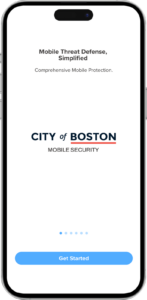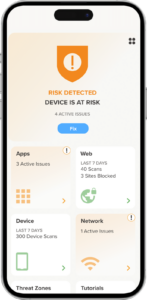In our increasingly connected world, mobile devices have become essential tools for both personal and professional activities. These devices (like smartphones, tablets, and Chromebooks) store sensitive information, grant access to financial accounts, and connect us with loved ones. As our reliance on mobile devices grows, so does the importance of mobile security. Just in time for Cybersecurity Awareness Month, the Technology and Innovation Department of the City of Boston (DoIT) is releasing Secure Boston, a mobile security app that’s free to its residents and powered by Zimperium.
Secure Boston: A Trusted Mobile Security Application
Mobile device security can be daunting for everyday users, especially students who don’t think twice about the potential risks of the apps they download. Looking for a mobile app that can preserve the user’s privacy is vital to providing the proper safeguards to protect users – of all ages – from attacks and scams.
Secure Boston is just one of the local municipalities bridging this digital divide and safeguarding residents with a free mobile app requiring no personal or private information collection— keeping the user protected and their privacy intact.


The Secure Boston app features:
- Wi-Fi Network Alerts: Get instant notifications about unsecure Wi-Fi hotspots and networks to ensure secure browsing.
- Android App Safety: Detects and warns against unsafe apps on Android devices, preventing potential threats.
- Detection of System Tampering: Receive immediate notifications if the integrity of a user’s device is compromised.
- Detection of Phishing: Provides a phishing link check within the app to determine if links (URLs) or QR codes are safe or to enable the VPN for comprehensive phishing protection.
Users will get alerts of these threats to their mobile device while enabling them to decide what actions to take to help protect themselves and the data on their smartphone.
Why Mobile Security Matters for Everyday Essentials
With the widespread usage of mobile devices, mobile devices have become prime targets for cybercriminals. In fact, 80% of phishing attacks targeted mobile devices or were designed to function on both mobile devices and desktops for enterprise users. Mobile attacks are constantly evolving, increasingly impacting consumer end users.
As we head into the holiday shopping season, attackers are waiting to scam online shoppers through tactics like phishing email campaigns, fake networks masquerading behind public Wi-Fi networks, or relying on shoppers to download third-party apps embedded with malicious software known as malware. Understanding what is at risk is the first step to preventing or minimizing an attacker’s access to sensitive and financial data.
Protecting Personal Data
Mobile devices contain a treasure trove of personal information, including photos, messages, email, contact details, and passwords. Attackers are searching for this information to sell on the dark web or to use for a targeted attack at the user’s place of employment (this tactic is known as spearphishing). Ensuring this data’s security is paramount to protecting an individual’s digital identity, especially for students.
Preventing Financial Loss and Scams
Many people use their mobile devices for online banking, shopping, and managing financial accounts, which are prime activities that attackers target to gain access to that information. Without the proper security measures, even for everyday users, these activities can expose them to economic losses due to scams and cyberattacks.
Protecting Against Unauthorized Access
Mobile devices are small and portable, which makes them the perfect target for attackers. On a desktop, seeing where a link is going or who sent an email is more accessible. On a personal mobile device, it is difficult to find this information. Individuals must take additional precautions when clicking links via text messages, messaging apps, or emails. In addition, understanding why a mobile app needs access to critical settings on your device is a red flag to watch out for.
Mobile Apps Leaking Data or Spying
Apps like everyday tools downloaded from the app store or third parties could be deemed high-risk. For example, if a user downloads a new calculator app and is prompted with a pop-up to give access to hardware such as a microphone, camera, or information such as photos and contacts, these actions could compromise the device, personal and financial information, and give unauthorized access to online accounts.
Zimperium, the leader in mobile-first security, is a proud partner of the City of Boston DoIT, providing this free app to its residents. Zimperium has also partnered with New York, Los Angeles, the State of Michigan, and Dallas to provide privacy-first mobile security for all ages.
To learn more about our Resident Safety initiative, contact us today.
Download Secure Boston
The Secure Boston app is now available for iOS and Android devices. Download the app today for free!



